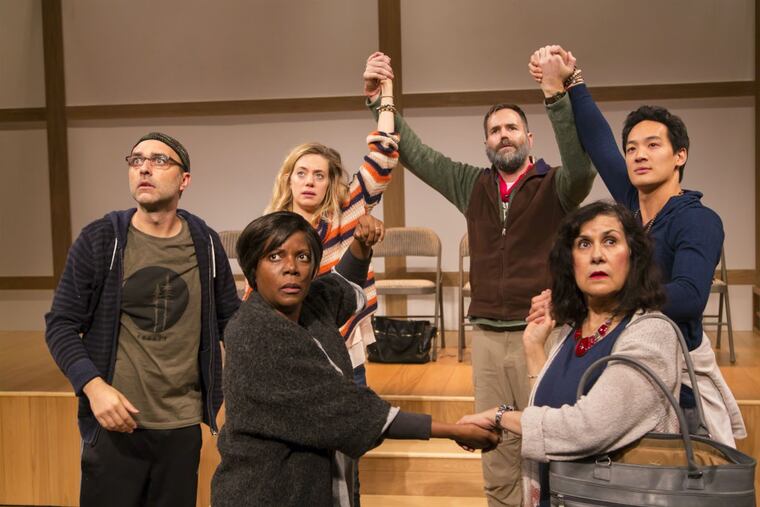'Small Mouth Sounds' at Philadelphia Theatre Company: Sensitive, artful drama of silence and need
Bess Wohl's Obie Award-winning "Small Mouth Sounds," through April 1 at the Philadelphia Theatre Company, follows six fugitives from city life as they go to a silent retreat. We watch the frayed and fugitive connections that develop among these men and women - needy, wounded souls all, to varying degrees. It's a sensitive, artful exploration of words, silence, and our need to connect.

It seems like a particularly daunting playwriting exercise: Convene six characters for a five-day, silent-meditation retreat, and find the resulting drama.
In Bess Wohl's Obie Award-winning Small Mouth Sounds, through April 1 at the Philadelphia Theatre Company, that (admittedly low-key) drama turns on the frayed and fugitive connections that develop among these men and women – needy, wounded souls all, to varying degrees. As the disembodied voice representing their teacher (Orville Mendoza) reminds them in the end: "You are not alone."
To a friend who pursues meditation and has done a silent retreat, the play's premise rang false. While often practiced communally, meditation is not about such connections, he told me. It's a more private endeavor, aimed at getting more deeply in touch with one's self.
Caring less about meditation, I took Small Mouth Sounds less literally and found it more moving. Though not devoid of dialogue, the touring Ars Nova production – sensitively directed by Rachel Chavkin and presented by the Philadelphia Theatre Company – is quiet enough to induce something of a meditative state in the audience. The show is buoyed by a sterling ensemble, Mike Inwood's delicate lighting, and the gorgeous scene-setting video design of Andrew Schneider.
Inspired by Wohl's own visit to the Omega Institute in Upstate New York, the setup is simple: Three men and three women, in characteristically idiosyncratic ways, assemble for an introductory meeting at a forested retreat where bears run wild, clothing is optional at the lake, roommates are assigned, and incense, alcohol, smoking, and snacking are taboo.
The chiseled Rodney (Edward Chin-Lyn) effortlessly performs yoga poses and flaunts his muscles. His seeming poise contrasts with the awkwardness of scruffy-looking Ned (Brad Heberlee, in a particularly poignant performance) and the mysterious gentle giant Jan (Connor Barrett). A lesbian couple, Judy (Cherene Snow) and Joan (Socorro Santiago), enter bickering. Alicia (Brenna Palughi), flirting with hysteria and surgically melded to her smartphone, rushes in late.
The retreat's guru – who, it turns out, has his own troubles — relates a parable about a frog who leaves his little well and, in the company of another frog, finally sees the ocean. It does not end happily.
The remainder of the play (100 minutes without an intermission) follows the characters as they struggle to communicate without speaking. They occasionally slip, thank goodness ("Who needs enlightenment, let's have merlot," Joan urges her partner.) But, for the most part, the actors – and their characters – must convey both emotional nuances and specific messages through posture, movement, and gesture.
There's comedy here, and, at times, pathos – but also clichés, especially the inevitable frantic, spontaneous, ill-fated coupling. Too often the characters seem like a gaggle of Marcel Marceaus stumbling incomprehensibly through the conventions of mime.
The show's single lengthy speech – in which Ned, at a Q&A session, movingly details the cascading calamities that impelled him to the retreat – reminds us of the superiority of words as a means of communication.
Still, it is remarkable how artfully Wohl and the Ars Nova ensemble convey emotion within their self-imposed constraints.